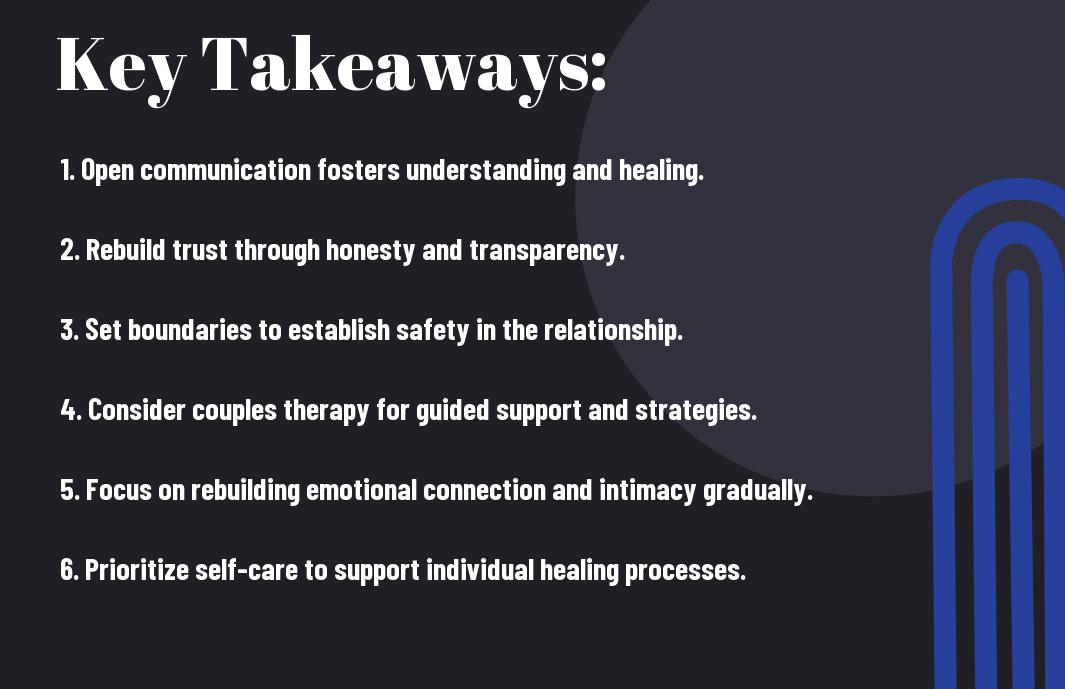Rebuilding trust and intimacy after infidelity can feel overwhelming, but it is a journey that many couples successfully navigate. You have the opportunity to transform your relationship by focusing on open communication, establishing boundaries, and seeking professional help through therapy. Understanding the emotions at play and actively working towards emotional healing are crucial steps in this process. This blog post will provide you with practical tips and explore various therapy options tailored to support you in revitalizing your connection and fostering a resilient partnership.
Key Takeaways:
- Open and honest communication is imperative for rebuilding trust after infidelity.
- Couples may benefit from professional therapy to navigate emotions and develop effective coping strategies.
- Establishing new boundaries can help partners feel safe and secure in the relationship moving forward.
- Engaging in shared activities and quality time can strengthen the bond between partners.
- Both partners need to take responsibility for their roles in the relationship, fostering accountability.
- Forgiveness is a process that takes time; patience is important as both partners work through their feelings.
- Setting realistic expectations for recovery can help couples avoid frustration and build resilience together.

Understanding Infidelity
To navigate the complex landscape of infidelity, it is crucial to grasp its multifaceted nature. Infidelity can manifest in various forms, including physical, emotional, or online engagements that breach the trust in a committed relationship. Understanding these nuances can assist you in addressing the underlying issues and working towards healing.
Causes of Infidelity
Infidelity often stems from a variety of factors, including emotional disconnection, unmet needs, or external stressors. Relationships may suffer when communication breaks down and partners grow apart, leading some to seek fulfillment outside the marriage. Recognizing these causes can empower you to address your relationship challenges constructively.
Emotional Impact on the Betrayed Partner
Betrayed partners typically experience a whirlwind of emotions, such as shock, anger, and profound sadness. The trust you’ve built may feel shattered, leaving you questioning both your self-worth and the relationship’s foundation. This emotional turmoil can create a cycle of pain that is difficult to navigate without support.
But the emotional aftermath of infidelity can also surface unexpected feelings of betrayal, leading to an intense struggle with self-esteem, anxiety, and depression. You might grapple with feelings of jealousy or fear of losing your partner, which can cloud your judgment. Awareness of these feelings is vital, as it allows you to seek the necessary support and begin the healing process, emphasizing resilience in the face of adversity.

Rebuilding Trust
One of the most challenging aspects of healing after infidelity is rebuilding trust. It requires patience and consistent effort from both partners. You need to actively engage in transparent communication, demonstrating that you are committed to making the relationship work. Trust can be rebuilt over time through sincere apologies, visible changes in behavior, and a willingness to face difficult conversations head-on.
Open Communication
Between you and your partner, open communication is vital for restoring trust. This means creating a safe space where both of you can express your feelings, fears, and questions without fear of judgment. It’s important to discuss the infidelity openly, ensuring that both partners feel heard and understood.
Setting Boundaries
Between partners, setting boundaries helps to create a framework for what is acceptable moving forward. This involves outlining behaviors or situations that may trigger feelings of insecurity or jealousy. Establishing these guidelines allows you to create a more secure environment in which trust can gradually rebuild.
With clear boundaries in place, you and your partner can develop a shared understanding of your relationship’s needs. This may involve discussing topics like communication frequency, social interactions with friends, or any triggers that could jeopardize your progress. By prioritizing these boundaries, you strengthen the relationship and create a space for healing and growth. It’s important to revisit and adjust these boundaries as your relationship evolves to ensure they remain effective and relevant.
Seeking Professional Help
Not every couple can navigate the emotional terrain of infidelity alone. Seeking professional help can be a vital step towards healing and rebuilding intimacy. A trained therapist can guide you through this challenging time, allowing you to explore feelings and communication in a safe environment. For additional resources on this path, check out Rekindling Desire After An Affair.
Types of Therapy
Against the backdrop of recovery, several therapy options exist to assist you:
| Couples Therapy | Focuses on rebuilding trust and communication. |
| Individual Therapy | Helps individuals process their own feelings. |
| Emotionally Focused Therapy | Targets emotional responses and connection rebuilding. |
| Dialectical Behavioral Therapy | Aims to manage emotional distress. |
| Group Therapy | Offers community support and shared experiences. |
Thou may find that these various forms of therapy can significantly enhance your healing journey.
Choosing the Right Therapist
Among the key decisions you will make is selecting a therapist who suits your needs. Consider their experience with issues surrounding infidelity and their therapeutic approach. The right fit can make a difference in your healing process while providing the support you require.
It’s imperative to choose a therapist who specializes in infidelity recovery, as they can provide tactics tailored to your situation. Look for someone with a strong track record in therapy, as they can guide you through your emotional landscape effectively. Trust your instincts; a good connection is vital. Evaluate their methods for encouraging open dialogue and if they foster an environment where both you and your partner feel safe sharing vulnerabilities. By doing so, your path to healing will be more positive.

Strategies for Reconnecting
Your journey to rebuild intimacy requires dedication and effort from both partners. To reconnect emotionally and physically, you must prioritize understanding each other’s needs and vulnerabilities. Focus on fostering forgiveness and open communication, creating a safe environment where both of you can share feelings without judgment. Consider incorporating activities that strengthen your bond, as these strategies can facilitate a deeper connection and renew trust between you and your partner.
Date Nights and Quality Time
Date nights can be a fun and meaningful way to rekindle your relationship. Set aside dedicated time for each other, free from distractions, to explore new activities or revisit reminisced experiences. Treat this time as an opportunity to deepen your connection—share thoughts, engage in meaningful conversations, and simply enjoy each other’s presence in a relaxed setting.
Physical Intimacy and Affection
Time spent nurturing physical intimacy can significantly improve your relationship. Engaging in small gestures of affection, like holding hands, hugging, or cuddling, can help reignite the spark you once shared. This physical connection lays the groundwork for more profound intimacy, signaling to each other that you are committed to the healing process.
Considering your past experiences, it’s important to gradually increase levels of physical affection while staying attuned to your partner’s comfort. Begin with simple gestures and ensure you’re both open to discussing what feels right. Focus on emotional safety by creating a trusting environment, which can help alleviate any lingering fears or insecurities. As intimacy blossoms, take note of your partner’s feedback and be adaptable to their needs, fostering a positive atmosphere for reconnecting.
Individual Healing
Once again, healing from infidelity requires you to focus on your individual journey. It’s important to acknowledge the pain you’re feeling while also working toward understanding and rebuilding your own sense of self. Engaging in personal healing allows you to process emotions, reflect on your desires, and ultimately foster a stronger, healthier future. This personal growth can serve as a foundation for any potential reconnection with your partner.
Self-Care for the Betrayed
Below is a list of self-care strategies that you can implement to support your healing process. These might include activities that nurture your physical health, such as regular exercise, or practices that boost your mental well-being, like mindfulness meditation. Prioritizing these efforts can significantly improve your emotional resilience and your overall perspective. Making space for your needs and feelings helps you regain a sense of control over your life.
The Importance of Personal Growth
Personal growth is important for developing a deeper understanding of yourself after betrayal. This process often involves exploring your emotions, values, and boundaries, which can empower you to make informed decisions about your future. SelfCare through this growth allows you to recognize patterns and develop healthier relationship dynamics moving forward. Additionally, investing in your personal development can lead to improved self-esteem and renewed optimism in future relationships and life ventures.
SelfCare plays a vital role in your journey of personal growth after infidelity. Focusing on self-improvement enables you to understand not only what went wrong in the relationship but also your role in it. Additionally, engaging in activities that inspire passion and creativity can foster a sense of fulfillment and excitement in your life. This healthy detachment from pain can pave the way for stronger relationships in the future, as you become more aware of your needs and capable of setting positive, clear boundaries.
Maintaining Progress
After navigating the tumultuous waters of infidelity, maintaining the progress you’ve made is crucial to rebuilding intimacy. This involves consistent effort and commitment from both partners to ensure that the relationship remains on a healthy trajectory. Establishing ongoing communication and reinforcing trust will not only foster a deeper connection but also act as a safeguard against potential setbacks.
Regular Check-Ins
Progress in your relationship can be sustained through regular check-ins with one another. Schedule dedicated time to discuss your feelings, concerns, and any lingering issues that may arise. This practice not only keeps both partners accountable but also ensures that both of you are on the same page about your emotional needs and the status of your relationship.
Continuing Therapy
Behind the scenes of rebuilding trust, continuing therapy can serve as a valuable support system for you and your partner. Engaging with a mental health professional can address deeper-rooted issues, providing tools to navigate personal challenges together.
Understanding the benefits of continuing therapy after infidelity can be a game-changer in your relationship. Therapy sessions offer a safe space for both of you to openly express feelings and work through complex emotions that may arise. An experienced therapist can help identify patterns of behavior that need to be adjusted while offering strategies to enhance communication. By investing in ongoing therapy, you actively work towards healing, ensuring that both of you have support as you continue on your journey to rebuild trust and intimacy.
To wrap up
To wrap up, rebuilding intimacy after infidelity involves a combination of open communication, understanding emotions, and a commitment to healing together. You may benefit from discussing your feelings openly and considering therapy as a structured approach to navigate this challenging journey. Engaging in activities that foster connection can also help rekindle your bond. By being patient with yourself and your partner, you can ultimately rebuild trust and intimacy over time, leading to a more resilient and fulfilling relationship.
FAQ
Q: What are the initial steps to take after discovering infidelity?
A: When infidelity is discovered, it is important to take some initial steps to navigate the emotional turmoil. First, allow yourself to process your feelings without rush. Communication is key; discuss the situation calmly with your partner if you feel ready. Consider seeking individual therapy to explore your emotions and assess the situation clearly. Establish boundaries for discussions about the infidelity, and ensure both partners feel safe to talk about their feelings. Taking time for self-care and reaching out to supportive friends or family can also help during this difficult period.
Q: How can couples rebuild trust after infidelity?
A: Rebuilding trust requires consistent effort and open communication from both partners. Start by having honest conversations about feelings, motivations, and consequences without placing blame. Engaging in couple’s therapy can provide a safe space for these discussions, guided by a trained therapist. Establishing transparency through shared commitments and avoiding secrets is vital. Regularly checking in with each other can help maintain an ongoing dialogue about progress and feelings, which is vital in the trust-building process.
Q: Are there specific therapy options recommended for couples dealing with infidelity?
A: Yes, several therapy options can be beneficial for couples experiencing infidelity. Couples therapy, especially approaches like Emotionally Focused Therapy (EFT) or the Gottman Method, focuses on communication and emotional healing. Individual therapy can also assist partners in processing personal feelings and developing coping strategies. In addition, attending support groups for partners of infidelity can provide shared experiences and advice, fostering a sense of community and understanding during a challenging time.
Q: What role does communication play in the healing process after infidelity?
A: Effective communication is pivotal in the healing process after infidelity. Openly discussing feelings, fears, and expectations can promote understanding and empathy between partners. It is important to practice active listening and validate each other’s emotions during these conversations. Setting aside time for regular check-ins can ensure ongoing communication, helping partners articulate their needs and thoughts. This commitment to dialogue can create a stronger emotional connection, supporting both partners in their healing journey.
Q: How long does it typically take to rebuild intimacy after infidelity?
A: The timeline for rebuilding intimacy varies significantly from couple to couple, as it depends on numerous factors, including the individuals involved, the nature of the infidelity, and the level of commitment to the healing process. It generally requires time, patience, and consistent effort from both partners. Open communication and the willingness to work through feelings together can help speed up this process. Some couples may find they can rebuild intimacy within a matter of months, while for others, it may take longer to feel truly connected again. It’s vital to focus on progress rather than a specific timeline.
